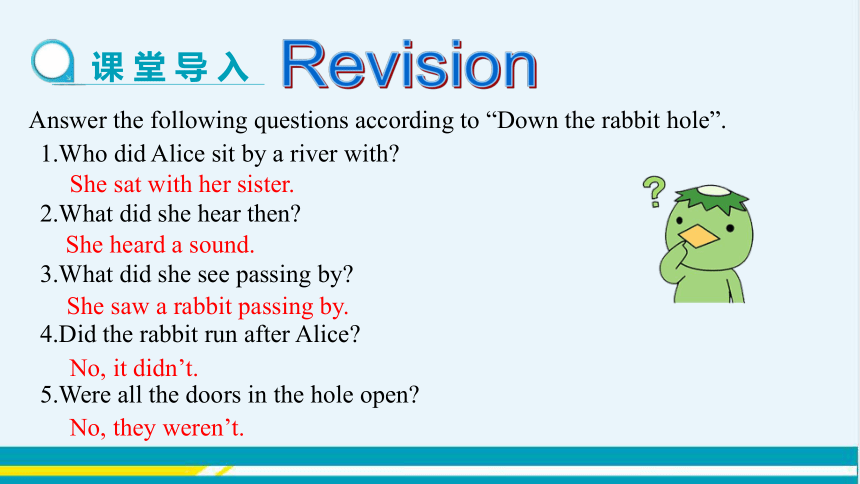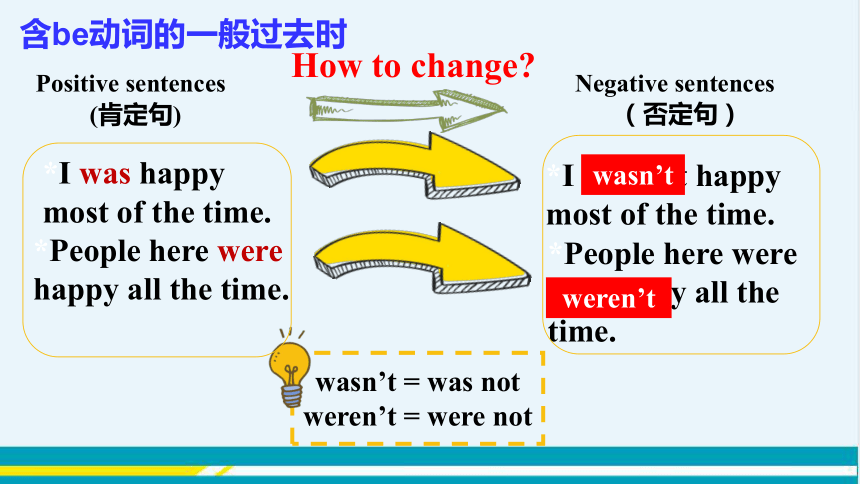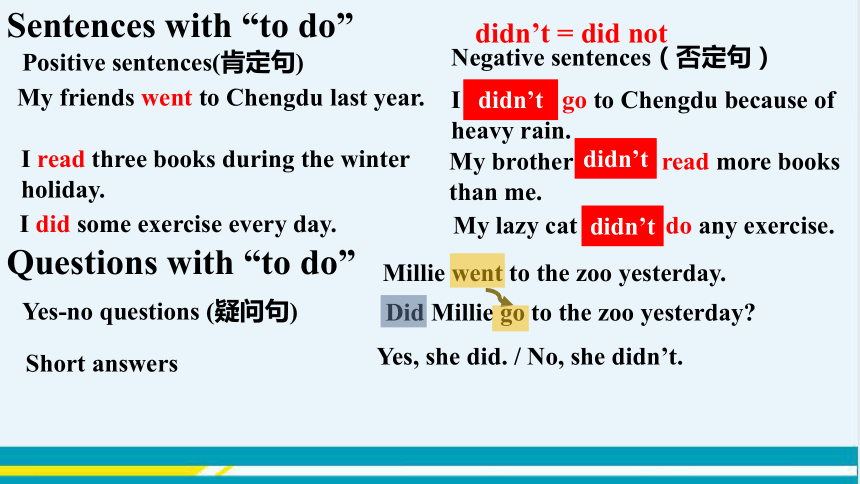Unit 6 Grammar教学课件-译林牛津版初中英语七年级(下)
文档属性
| 名称 | Unit 6 Grammar教学课件-译林牛津版初中英语七年级(下) |  | |
| 格式 | pptx | ||
| 文件大小 | 720.7KB | ||
| 资源类型 | 试卷 | ||
| 版本资源 | 牛津译林版 | ||
| 科目 | 英语 | ||
| 更新时间 | 2024-02-21 19:31:32 | ||
图片预览









文档简介
(共20张PPT)
Grammar
Unit 6 Outdoor fun
学 习 目 标
掌握本课节的新单词和短语:put up,tent
1
3
能在对话中使用一般过去时。
能掌握一般过去时的肯定、否定和疑问句式。
2
课 堂 导 入
Revision
Answer the following questions according to “Down the rabbit hole”.
1.Who did Alice sit by a river with
2.What did she hear then
3.What did she see passing by
4.Did the rabbit run after Alice
5.Were all the doors in the hole open
She sat with her sister.
She heard a sound.
She saw a rabbit passing by.
No, it didn’t.
No, they weren’t.
否定式
疑问式
含实义动词的一般过去时
肯定式
She sat with her sister.
She didn’t sit with her sister.
Did the rabbit run after Alice
课 堂 学 习
Positive sentences
(肯定句)
Negative sentences
(否定句)
How to change
*I was happy most of the time.
*I was not happy most of the time.
wasn’t = was not
weren’t = were not
*People here were not happy all the time.
*People here were happy all the time.
wasn’t
weren’t
含be动词的一般过去时
She was happy.
Was she happy
Were they at home
They were at home.
Positive sentences
(肯定句)
Short answers
Yes-no questions
(疑问句)
Yes, she was.
No, she wasn’t.
Yes, they were.
No, they weren’t.
含be动词的一般过去时
Practice
Mary (be) at home yesterday. She (be not) at school .
2. The boy (be) in the library now. But he (be) in the
library just now, because he had a Chinese lesson.
3. We (be not) in Beijing last week. We (be) at home.
4. Kitty and I (be not) happy because of the bad weather
this morning.
5. — _____ you at the butcher's yesterday — No, I ________.
6. — ____ he absent from school last week — Yes, he ____.
was
wasn’t
is
wasn’t
weren’t
were
weren’t
Were
wasn't
Was
was
Positive sentences (肯定句):
Subject (主语) + ________ (be) + …….
Negative sentences (否定句):
Subject (主语) + _______________ (not be) + ……
was/were
wasn’t/weren’t
We use the simple past tense of the verb “to be” to make positive and negative sentences like this:
Work out the rule
We use the simple past tense of the verb “to be” to ask and answer questions like this:
_____ (be) + Subject (主语) + …?
Yes, Subject + ____________ (be).
No, Subject + ______________ (be).
Was/Were
was/were
wasn’t/weren’t
I read three books during the winter holiday.
I did some exercise every day.
I did not go to Chengdu because of heavy rain.
Positive sentences(肯定句)
Negative sentences(否定句)
My friends went to Chengdu last year.
My lazy cat did not do any exercise.
My brother did not read more books than me.
Sentences with “to do”
Questions with “to do”
Yes-no questions (疑问句)
Millie went to the zoo yesterday.
Did Millie go to the zoo yesterday
Short answers
Yes, she did. / No, she didn’t.
didn’t
didn’t = did not
didn’t
didn’t
Practice
We always (go) to Shanghai when I was a child.
2. They (not go) to school last Wednesday; they (have) a match.
3. Mike (drive) to Nanjing three days ago; he
(not take) a train there.
4. She seldom (arrive) home late after work, but she______ (come) back at 10p.m. yesterday.
went
didn’t go
had
drove
didn’t take
arrived
came
The girl was at home last night. (改为一般疑问句,并
作肯定回答)
They played football ten minutes ago. (改为一般疑问句,
并作否定回答)
Was the girl at home last night Yes, she was.
Did they play football ten minutes ago No, they didn’t.
Positive sentences (肯定句):
Subject (主语) + _________________ (do) + …….
Negative sentences (否定句):
Subject (主语) + ___________________ (not do) + ……
V-p. (动词过去式)
didn’t + V. (动词原形)
We use the simple past tense of the verb “to do”to make positive and negative sentences like this:
Work out the rule
We use the simple past tense of the verb “to do” to ask and answer questions like this:
__ + Subject (主语) + _________ (do) + ...?
Yes , Subject (主语) + __. No , Subject (主语) + ___.
Did
V(动词原形)
did
did
didn’t
助记一般过去时态
动词一般过去时,表示过去发生事;
be用was或用were, have, has变had;
谓语动词过去式,过去时间做标志;
一般动词加-ed,若是特殊得硬记。
否定句很简单,主语之后didn’t添;
疑问句也不难,did放在主语前;
谓语之前有did,谓语动词需还原;
动词若是was, were,否定就把not添。
Weekend activities
A. Millie is writing about what she and her friends did last weekend. Help her complete her article.
do go have play practise read stay visit
Yesterday was Sunday. I _______ the park and ____ a good time. Simon did not ____ football. He________ playing volleyball with his friend. Kitty likes shopping. She ______ some shopping with her mum yesterday afternoon. Daniel did not ____ out yesterday. He ______ at home and_____ some books.
visited
had
play
practised
did
go
stayed
read
Sandy: (1)_____ you and your family _____ (go) camping last week
Simon: No, we (2)______ . We (3) _____ (go) camping last month.
Sandy: (4)____ (be) it interesting
Simon: Yes, it (5)____ .
Sandy: What (6)____ you ___ (do) there
Simon: We (7)____ (put) up our tent near a lake.
My cousin Annie and I (8)____ (be) very
happy. We also (9) ______ (row) a boat on the lake.
Sandy: (10) ____ you____ (stay) outside all night
Simon: Yes, we (11) ___ . The camping trip (12) ____ (be)
really wonderful.
Did
go
didn’t
went
Was
was
did
do
put
were
rowed
Did
stay
did
was
The camping trip
Sandy is asking Simon about his camping trip with his family.
Complete the conversation.
put up 搭起,设立
put up the tent 搭帐篷
Finish Part B on Page 74.
在湖上划船
整晚上都待在外面
Language points
1. He practised playing volleyball with his friends.
他和他的朋友练习打排球。
practise动词,意为“练习”,后接名词、代词或动词-ing形式。
practise doing sth.意为“练习做某事”。
Let’s practise reading English stories. 我们练习读英语故事吧。
2. We put up out tent near a lake.我们在湖边搭起了帐篷。
put up搭起。还可表示“挂起,张贴,举起,拾起”。
How about putting up a tent here?在这儿搭个帐篷怎么样?
Put up a picture on the wall, please.请在墙上张贴一张图片。
课 堂 达 标
Ⅰ.单项填空
( )1.— Don’t you see the sign “No parking!” on the right
—Sorry, I______. But now I know parking here is not right.
A. don’t B. didn’t C. hadn’t D. doesn’t
( )2. There______a class meeting in Class 2, Grade 7 last Friday.
A. was B. will be C. had D. were
( )3. He_______ like playing volleyball when he was a child.
A. don’t B. doesn’t C. didn’t D. did
( )4. — Could you please help me___the picture on the wall — OK, no problem.
A. put up B. put on C. put off D. put out
( )5. — Oh God! I __________you were in Beijing too! When did you come
— I have lived in Beijing since 2015.
A. don’t know B. didn’t know C. haven’t known D. wasn’t known
( )6. — Who______you English
— Mr Zhang does. But he_______ at No. l Middle School last year.
A. teaches; teaches B. teaches; taught C. taught; teaches D. taught, taught
B
A
C
A
B
B
Ⅱ.用所给单词的适当形式填空
— What did you have for your breakfast, Daniel
— I _______(eat) some bread and drank some milk.
2. — Were they late for the meeting yesterday afternoon
— Yes, they ________(be).
3. — Who_________(teach) you English last term —Mr Zhang did.
4. At last, he_________(find) there was nothing to eat in the kitchen.
5. Tom__________(bring) his dictionary to the school yesterday.
6. — What did you hear just now — I________(hear) a strange sound.
7. Mr Smith___________(not go) to bed until 11 o’clock last night.
8. She_________(not be) at home last night.
9. — Were you at home yesterday evening —Yes, I_______(be).
10. “I_______(take) these books home yesterday,” said Mary.
ate
were
taught
found
brought
heard
didn’t go
wasn’t
was
took
Homework
1.Talk with your classmates about the rules we learnt today.
2.Preview Integrated skills.
Thank you !
Grammar
Unit 6 Outdoor fun
学 习 目 标
掌握本课节的新单词和短语:put up,tent
1
3
能在对话中使用一般过去时。
能掌握一般过去时的肯定、否定和疑问句式。
2
课 堂 导 入
Revision
Answer the following questions according to “Down the rabbit hole”.
1.Who did Alice sit by a river with
2.What did she hear then
3.What did she see passing by
4.Did the rabbit run after Alice
5.Were all the doors in the hole open
She sat with her sister.
She heard a sound.
She saw a rabbit passing by.
No, it didn’t.
No, they weren’t.
否定式
疑问式
含实义动词的一般过去时
肯定式
She sat with her sister.
She didn’t sit with her sister.
Did the rabbit run after Alice
课 堂 学 习
Positive sentences
(肯定句)
Negative sentences
(否定句)
How to change
*I was happy most of the time.
*I was not happy most of the time.
wasn’t = was not
weren’t = were not
*People here were not happy all the time.
*People here were happy all the time.
wasn’t
weren’t
含be动词的一般过去时
She was happy.
Was she happy
Were they at home
They were at home.
Positive sentences
(肯定句)
Short answers
Yes-no questions
(疑问句)
Yes, she was.
No, she wasn’t.
Yes, they were.
No, they weren’t.
含be动词的一般过去时
Practice
Mary (be) at home yesterday. She (be not) at school .
2. The boy (be) in the library now. But he (be) in the
library just now, because he had a Chinese lesson.
3. We (be not) in Beijing last week. We (be) at home.
4. Kitty and I (be not) happy because of the bad weather
this morning.
5. — _____ you at the butcher's yesterday — No, I ________.
6. — ____ he absent from school last week — Yes, he ____.
was
wasn’t
is
wasn’t
weren’t
were
weren’t
Were
wasn't
Was
was
Positive sentences (肯定句):
Subject (主语) + ________ (be) + …….
Negative sentences (否定句):
Subject (主语) + _______________ (not be) + ……
was/were
wasn’t/weren’t
We use the simple past tense of the verb “to be” to make positive and negative sentences like this:
Work out the rule
We use the simple past tense of the verb “to be” to ask and answer questions like this:
_____ (be) + Subject (主语) + …?
Yes, Subject + ____________ (be).
No, Subject + ______________ (be).
Was/Were
was/were
wasn’t/weren’t
I read three books during the winter holiday.
I did some exercise every day.
I did not go to Chengdu because of heavy rain.
Positive sentences(肯定句)
Negative sentences(否定句)
My friends went to Chengdu last year.
My lazy cat did not do any exercise.
My brother did not read more books than me.
Sentences with “to do”
Questions with “to do”
Yes-no questions (疑问句)
Millie went to the zoo yesterday.
Did Millie go to the zoo yesterday
Short answers
Yes, she did. / No, she didn’t.
didn’t
didn’t = did not
didn’t
didn’t
Practice
We always (go) to Shanghai when I was a child.
2. They (not go) to school last Wednesday; they (have) a match.
3. Mike (drive) to Nanjing three days ago; he
(not take) a train there.
4. She seldom (arrive) home late after work, but she______ (come) back at 10p.m. yesterday.
went
didn’t go
had
drove
didn’t take
arrived
came
The girl was at home last night. (改为一般疑问句,并
作肯定回答)
They played football ten minutes ago. (改为一般疑问句,
并作否定回答)
Was the girl at home last night Yes, she was.
Did they play football ten minutes ago No, they didn’t.
Positive sentences (肯定句):
Subject (主语) + _________________ (do) + …….
Negative sentences (否定句):
Subject (主语) + ___________________ (not do) + ……
V-p. (动词过去式)
didn’t + V. (动词原形)
We use the simple past tense of the verb “to do”to make positive and negative sentences like this:
Work out the rule
We use the simple past tense of the verb “to do” to ask and answer questions like this:
__ + Subject (主语) + _________ (do) + ...?
Yes , Subject (主语) + __. No , Subject (主语) + ___.
Did
V(动词原形)
did
did
didn’t
助记一般过去时态
动词一般过去时,表示过去发生事;
be用was或用were, have, has变had;
谓语动词过去式,过去时间做标志;
一般动词加-ed,若是特殊得硬记。
否定句很简单,主语之后didn’t添;
疑问句也不难,did放在主语前;
谓语之前有did,谓语动词需还原;
动词若是was, were,否定就把not添。
Weekend activities
A. Millie is writing about what she and her friends did last weekend. Help her complete her article.
do go have play practise read stay visit
Yesterday was Sunday. I _______ the park and ____ a good time. Simon did not ____ football. He________ playing volleyball with his friend. Kitty likes shopping. She ______ some shopping with her mum yesterday afternoon. Daniel did not ____ out yesterday. He ______ at home and_____ some books.
visited
had
play
practised
did
go
stayed
read
Sandy: (1)_____ you and your family _____ (go) camping last week
Simon: No, we (2)______ . We (3) _____ (go) camping last month.
Sandy: (4)____ (be) it interesting
Simon: Yes, it (5)____ .
Sandy: What (6)____ you ___ (do) there
Simon: We (7)____ (put) up our tent near a lake.
My cousin Annie and I (8)____ (be) very
happy. We also (9) ______ (row) a boat on the lake.
Sandy: (10) ____ you____ (stay) outside all night
Simon: Yes, we (11) ___ . The camping trip (12) ____ (be)
really wonderful.
Did
go
didn’t
went
Was
was
did
do
put
were
rowed
Did
stay
did
was
The camping trip
Sandy is asking Simon about his camping trip with his family.
Complete the conversation.
put up 搭起,设立
put up the tent 搭帐篷
Finish Part B on Page 74.
在湖上划船
整晚上都待在外面
Language points
1. He practised playing volleyball with his friends.
他和他的朋友练习打排球。
practise动词,意为“练习”,后接名词、代词或动词-ing形式。
practise doing sth.意为“练习做某事”。
Let’s practise reading English stories. 我们练习读英语故事吧。
2. We put up out tent near a lake.我们在湖边搭起了帐篷。
put up搭起。还可表示“挂起,张贴,举起,拾起”。
How about putting up a tent here?在这儿搭个帐篷怎么样?
Put up a picture on the wall, please.请在墙上张贴一张图片。
课 堂 达 标
Ⅰ.单项填空
( )1.— Don’t you see the sign “No parking!” on the right
—Sorry, I______. But now I know parking here is not right.
A. don’t B. didn’t C. hadn’t D. doesn’t
( )2. There______a class meeting in Class 2, Grade 7 last Friday.
A. was B. will be C. had D. were
( )3. He_______ like playing volleyball when he was a child.
A. don’t B. doesn’t C. didn’t D. did
( )4. — Could you please help me___the picture on the wall — OK, no problem.
A. put up B. put on C. put off D. put out
( )5. — Oh God! I __________you were in Beijing too! When did you come
— I have lived in Beijing since 2015.
A. don’t know B. didn’t know C. haven’t known D. wasn’t known
( )6. — Who______you English
— Mr Zhang does. But he_______ at No. l Middle School last year.
A. teaches; teaches B. teaches; taught C. taught; teaches D. taught, taught
B
A
C
A
B
B
Ⅱ.用所给单词的适当形式填空
— What did you have for your breakfast, Daniel
— I _______(eat) some bread and drank some milk.
2. — Were they late for the meeting yesterday afternoon
— Yes, they ________(be).
3. — Who_________(teach) you English last term —Mr Zhang did.
4. At last, he_________(find) there was nothing to eat in the kitchen.
5. Tom__________(bring) his dictionary to the school yesterday.
6. — What did you hear just now — I________(hear) a strange sound.
7. Mr Smith___________(not go) to bed until 11 o’clock last night.
8. She_________(not be) at home last night.
9. — Were you at home yesterday evening —Yes, I_______(be).
10. “I_______(take) these books home yesterday,” said Mary.
ate
were
taught
found
brought
heard
didn’t go
wasn’t
was
took
Homework
1.Talk with your classmates about the rules we learnt today.
2.Preview Integrated skills.
Thank you !
